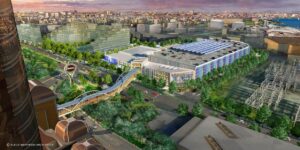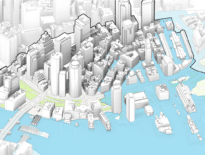Just like commuters on nearby Interstate 93, the planned expansion of the Encore Boston Harbor casino in Everett is being held up by traffic.
The Executive Office of Energy and Environmental Affairs declined to approve the project’s environmental impact report last week. Instead, the state ordered the casino company to submit an updated version that includes “a comprehensive response” to public comments that EEA said “raise serious concerns about the level of parking proposed by the project, question the methodology used to estimate parking needs for the project change, and request further analysis and consultation to ensure that mitigation commitments are commensurate with the increase in impacts proposed.”
Encore parent company Wynn Resorts is seeking to construct a new development across Broadway from its resort casino to host a dedicated poker room, a second sports betting parlor, a relocated nightclub, a theater, a comedy club, parking garage and more. That initial phase of a larger redevelopment plan would be connected by a pedestrian bridge to the $2.6 billion casino that opened in 2019.
Joe Delaney, the Gaming Commission’s chief of community affairs, told gaming regulators Thursday that the proposal won the approval of the Everett Planning Board last week, but that others in state and local government “have been pushing back a little bit on the amount of parking that’s being provided” and that Encore will need to submit more information before a key state environmental approval could be granted.
“The key issues, as you might imagine, revolve around traffic. So it’s really parking and traffic,” Delaney said. He added, “You know, they like to see parking limited somewhat so that people use public transportation. So that’s an issue that still remains, and there are some other issues around the general traffic mitigation.”
On Monday, Energy and Environmental Affairs Secretary Rebecca Tepper determined that the Final Environmental Impact Report (FEIR) that Encore submitted for the expansion “does not adequately and properly comply with [the Massachusetts Environmental Protection Act] and its implementing regulations, and therefore requires the filing of a Supplemental FEIR” that addresses specific concerns.
Tepper wrote that the proposed expansion “will add significant new traffic to the area and proposes to increase the number of parking spaces (all free of charge) to almost double the level proposed for the original project” and said its approval “could set precedents for future development in the surrounding areas, which the City of Everett has proposed to develop as a ‘destination district.'”
Encore already has a parking garage with 2,914 on-site spaces and also has another 800 parking spaces available off-site, according to the Gaming Commission.
The first phase of Encore’s planned expansion includes the construction of a seven-story parking garage with 2,137 spaces – of which 450 spaces will replace the parking lot that is on that land already and 1,687 spaces will be new. Future phases of the casino company’s plans call for two more parking garages, according to Tepper’s decision letter.
The secretary also points out that only 1,445 of the 2,137 parking spaces to be constructed in the first garage are actually needed to accommodate the first phase of Encore’s expansion and that the first garage “is proposed to partially meet parking needs in future phases” of construction.
“While I acknowledge that a gaming establishment could be viewed to be unique, construction of a 2,137-space parking garage offered free of charge (with the exception of special events, discussed below) appears unprecedented for developments of similar size proposed in dense urban areas like Everett and surrounding municipalities,” Tepper wrote. “Consistent with comments from the City of Somerville and City of Boston, the Supplemental FEIR should provide further justification for the parking needs.”
In a letter to Tepper commenting on the environmental impact report for the Encore expansion, Boston city officials said the Everett development proposal includes some measures that contribute to solutions for the “regional transportation challenges that converge in this area” like expanding transit service for employees and customers, but that other aspects of the plan “run counter to not only those same mitigation measures, but also economic development and climate priorities that hinge on reducing travel by personal vehicles.”
Boston and Somerville both argued that Encore’s plan includes too much parking and took issue with the way that the plan calculated what it considered necessary. Somerville specifically asked for a maximum of 1,928 parking spaces and said Encore’s plan “uses illegitimate methods to calculate its proposed parking supply, inventing inflation factors such as ‘operational capacity factor’ and ‘parking inefficiencies factor’ to justify the addition of 517 parking spaces.”
About 92 percent of Encore patrons arrived at the casino site by either their personal vehicle (57 percent) or a taxi/ride-hailing (35 percent) service in 2021, according to a chart included in Tepper’s letter. The new plan aims to reduce that percentage to about 77 percent — 45 percent for personal vehicles and 32 percent for taxis/ride-share.
“In the face of a duel [sic] climate and congestion crisis, it is unconscionable for a development of this magnitude to move forward with the expectation that such a vast majority of trips will be made by vehicle,” Metropolitan Area Planning
Council Executive Director Marc Draisen wrote. He added, “In its current form, this very substantial project is likely to have very damaging impacts on our climate and our environment and will negatively impact our emission reduction goals, primarily due to the proposed number of (mostly free) parking spaces.”
In its comments to Tepper, the Mass. Department of Transportation commended Encore for reducing the number of parking spaces it is seeking by 452 spaces since an earlier version of its plan. MassDOT said that it would “continue to encourage the Proponent to reduce parking to encourage mode shift,” but also acknowledged that a shortage of parking could lead to other problems in the congested area.
“We understand that it is also important to right-size the amount of parking spaces and ensure any shortage of parking does not result in an increase of rideshare trips, which could then exacerbate traffic operations at the Project’s site drive on Broadway and spillback to nearby intersections,” the agency wrote.
The Gaming Commission has already removed some hurdles from Encore’s path to expansion, but Delaney said Thursday that the commission will still need to “amend the gaming license and then the operations certificate, and amend the section 61 findings.” Section 61 relates to potential damage to the environment from a project and the steps taken to avoid or minimize the damage.
Commissioner Brad Hill asked Thursday if there was any opportunity for the Gaming Commission to be involved in the transportation planning aspect of the review.
“What I’ve seen over the last couple of years since COVID – locally in the city and other places across the nation – is these good plans that want to push people to public transportation are good in thought. But once the plans are laid out, they don’t always get the results that they wanted because people don’t trust public transportation,” Hill said. “So when I see that people are trying to be pushed to public transportation and I see people not using public transportation, a red flag goes up in regards to a plan that people think might work, but then ultimately don’t. And then we come back and we get criticized because the traffic is so bad, in this case around the casino.”






